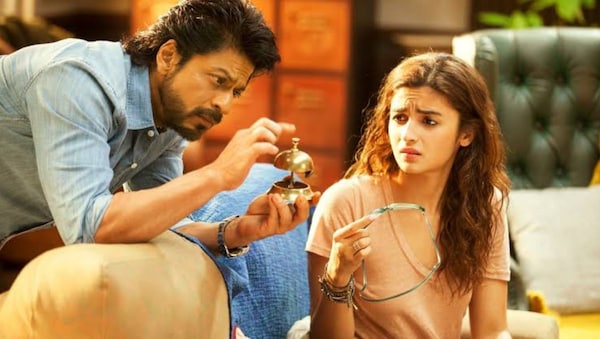Dear Zindagi turns 5: Why Gauri Shinde's heartwarming drama started a conversation around mental health
Dear Zindagi, starring Shah Rukh Khan and Alia Bhatt, is an articulate and impactful work of Indian cinema that deserves to be celebrated.

A still from Dear Zindagi | Twitter
Last Updated: 10.53 PM, Nov 26, 2021
Hindi cinema or the media discourse in India has not entirely relied on facts or logic in its portrayal or reportage on mental health. Judging by the way the unfortunate death of Sushant Singh Rajput was handled with heavy-handed sensationalism on TV news and over the internet, this pattern has often been mirrored on the big screen.
Not a lot of contemporary titles come to mind while listing films that have done right by the subject of mental health. Dear Zindagi, Gauri Shinde’s drama that takes a peek into the anxieties of a young woman Kaira (Alia Bhatt), is a pleasant exception. The enigmatic Shah Rukh Khan plays Dr Jehangir Khan whose dimpled smile feels like a warm embrace.
Kaira is a twenty-something cinematographer whose life has had upsetting bumps that have left her with sleepless nights. Eventually she fixes an appointment with Dr Jehangir whose talk she had once heard at a conference. The interaction between these two caught me by surprise, I was not expecting it to be so grounded in reality in spite of the Shah Rukh Khanness lurking in the background.
It was surprising because this issue has had a negative connotation attached to it. Only through mass media and other cultural mediums can there be a rift: this is only a shift in the positive direction. This is not the first article chronicling this thought again…
Depression and anxiety are not hawed and hummed over. There's no brushing these under the rug. There's no scary doctor with an evil gleam in his eye, ready to administer an electric shock. No one is loudly declared "pagal" (mad).
Sure, Dr Jehangir’s methods are a little unconventional (or out-of-the-box, call it what you want) – you can’t take the film entirely true to fact — the walks on the beach and rides around scenic Goa for sessions adds a bit of whimsical dramatisation, though nothing too harmful. But overall, his character adheres to the basic principles of a client-therapist relationship, easing a cynical Kaira into the proces. He doesn’t judge, and creates a safe space for Kaira. These are both valued characteristics in a good therapist, which allow her to express herself without any inhibitions.
When Kaira’s healing has reached its end, Jehangir parts ways with her on a professional note. There’s resistance from Kaira, the result of this does not lead to a cliched direction. No, as much as the inner romantic in us would have liked to flout the rules, blur the lines between right and wrong, the story never goes that way. There are also conversations between Bhatt and her friends — casual discussions — about what value therapy really does hold. They don’t for a second feel like it's watering down or stretching the narrative. Dear Zindagi is crisp all along. Except for the title song: it’s extremely corny.
The film has its flaws, forgivable flaws, which only make it an endearing watch. Then there’s the fact that the film resides in an urban milieu, not a reality lived by a large chunk of the Indian population. The narrative does alienate them, many come from a privileged, urban background like Kaira. The other side of the coin is to not minimise Dear Zindagi’s impact; even within a smaller demographic, the heartwarming drama stirred something, and started a conversation.
Another reason for its appeal are the actors. They are friendly familiar faces, with the former being a pop culture phenomenon who is hard to hate. There’s no melodrama, Kaira’s mental health struggles are not a cause for any theatrical turmoil.
Shinde captures this coming-of-age of the young character with a gentleness that the topic of mental health and the character of Kaira deserve. Dear Zindagi is an articulate, impactful work of Indian cinema that deserves to be celebrated.
Dear Zindagi is streaming on Netflix.

 Premium
Premium